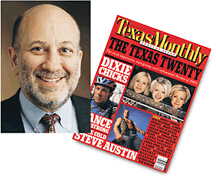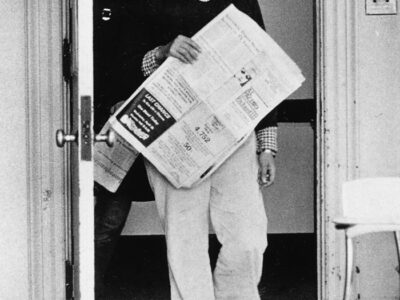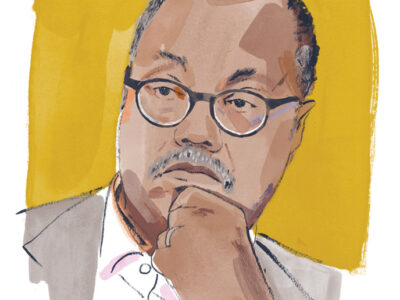
There are four things one must do upon moving to Texas: learn to love chicken-fried steak, buy a pair of cowboy boots and a matching cowboy hat, and subscribe to Texas Monthly magazine.
Texas Monthly, which Columbia Journalism Review recently cited as “one of the U.S.’s best magazines,” was founded by Michael R. Levy W’68. Levy sold the magazine two years ago to an Indiana company for a reported $37 million, but he remains the publisher.
The influence of Levy’s life work—he founded the magazine 27 years ago—goes far beyond the state’s 267,000 square miles. Texas Monthlyhas won more National Magazine Awards (eight) than any magazine save Atlantic, Esquire, Harper’s, Life and The New Yorker, each of which has been around a lot longer.
In January, Levy received the American magazine industry’s highest honor. At a black-tie dinner at New York’s Waldorf-Astoria, the Magazine Publishers of America presented him with its lifetime-achievement award. The Henry Johnson Fisher Award recognizes individuals who “have demonstrated extraordinary leadership, skill and understanding in helping the industry thrive or, through their editorial policies, addressed social, political, economic or lifestyle issues.”
Levy joins a pantheon of the magazine-world’s elite that include previous winners Henry R. Luce of Time Inc., Arnold Gingrich of Esquire, Malcolm Forbes of Forbes, Helen Gurley Brown of Cosmopolitan and fellow Wharton alumnus the Honorable Walter H. Annenberg W’31 Hon’66, former chairman of Triangle Publications.
Not bad for someone who was fired from WXPN in his freshman year for reading the news on the air, something he was under strict orders not to do.
“One Sunday morning, the guy who was supposed to do the news didn’t show up,” Levy recalls. “I said, ‘I’ll do it.”’
Levy had not been approved for on-air broadcasting. When station officials found out, they lit into him.
“Andrea Mitchell [CW’67, now chief foreign-affairs correspondent for NBC News and a Penn trustee] went nuts,” he says. “She basically fired me. She kicked me out of the station. It was a violation of station rules. But I did a fine job. I ripped and read. I wasn’t supposed to do it, but we would have had dead air.
“It wasn’t exactly an earth-shattering experience,” he says of his firing. “I shrugged my shoulders and said, ‘Well, they don’t want me here.’”
Despite a resume that lacked meaningful journalism credentials—aside from his brief WXPN experience, Levy had created a high-school literary magazine at St. Mark’s, the elite all-boys private school in Dallas, where he grew up—Levy was hired as a student stringer for the Philadelphia bureau of United Press International. When he wasn’t in his Wharton classes, he covered city crimes and 1960s protest-demonstrations for the bureau.
(His high-school literary magazine, however, was a better indication of what his future held. He created something from scratch, something that had no peer, and found talented young writers to fill his pages.
One such writer was schoolmate Tommy Lee Jones, who went on to fame as a movie actor.)
After graduating from Wharton, Levy realized that he had developed “an addiction to media,” so he took a job selling advertising for Philadelphia magazine. He could have remained at the magazine, but instead he borrowed the idea of a regional magazine and returned to the Lone Star State to create one.
First, though, he decided to complete his formal education by enrolling at the University of Texas School of Law because he believed that a law degree was excellent training for a young entrepreneur. “I was starting a business, and law teaches you how to manage relationships,” he says. He graduated in 1972, passed the Texas bar and immediately set out to find funding for his magazine.
There were successful city magazines, but a state magazine was a harder sell, especially in a state as large as Texas. “To me, Texas was one large city, and the neighborhoods were Dallas, Houston, San Antonio and Austin,” he says. All too often, that pitch fell on deaf ears. “It was obvious that it was like Mickey Rooney and Judy Garland saying, ‘Hey kids, let’s start a magazine!’” he says. “We didn’t know what we were doing.”
He finally secured startup capital from his mother, Florence, and his father, Harry, a plumber. “My mom and dad were big savers, but it was a huge amount of money for them,” the son recalls.
“It was our security,” Florence Levy says. “But we felt he was so determined that he had to succeed.”
Next, he needed to find an editor-in-chief. Once again, the Mickey Rooney/Judy Garland factor played itself out. “Nobody would take me seriously,” he says.
He visited a respected former art critic from the Houston Postwhose hiring would have brought the publication instant respectability. Levy gave her a two-hour pitch, and the woman said she would think about it. He left her apartment, walked outside into a torrential downpour and, in the confusion, stepped right into a swimming pool. In his three-piece suit and carrying a heavy briefcase with presentation materials, Levy sank to the bottom of the 10-foot-deep pool. He climbed out, returned to the woman’s apartment and asked if he could come inside to dry. “For some strange reason,” he says, “she pulled herself out of contention.”
The first issue of Texas Monthly hit the streets—and ranches, pastures and prairies—of Texas in February 1973 with a cover story on Dallas Cowboys quarterback Dandy Don Meredith. Circulation was 20,000. There were eight pages of advertising in the first issue, half that in the second. The Austin offices were dingy. There was one electric typewriter which everyone shared. The staff was young and raw.
“We were scared,” Levy said. “I tell people that those who remember the good old days have bad memories. Every day we were close to closing. We were a shoestring operation for the first year. But we worked hard. From day one, I surrounded myself with people far brighter, more capable and nicer than me.”
But his idea worked. Partly, Texas Monthly was a success because there was nothing else to compare it to. Partly, the magazine worked because it had humor, attitude, great writing and a state rich with stories worth telling.
Florence Levy ran her own marketing efforts back home in Dallas. She checked newsstands and supermarkets, constantly complaining about the magazine’s placement on the display racks. She had an investment —and a son’s dream—to protect. She’d call her son with periodic updates to tell him how many copies the local supermarket had sold. Often, she rearranged the magazines on the shelves. The distributor called Mike and pleaded with him to get his mother to leave the displays alone. No apologies, though, from Florence Levy: “All mothers want to see their children succeed,” she says.
Incredibly, that first year’s debut issues won the magazine’s first National Magazine Award. It was like winning Rookie of the Year and Most Valuable Player in the same year.
In the years since then, Texas Monthly has never ceased to surprise. Issue covers are art-pieces unto themselves, ensuring the magazine a place on the coffee tables of 300,000 buyers (today’s circulation). Talked-about stories on sports, literature, lifestyle, arts and politics have made the magazine something of a cultural icon.
“It often reflected an image that we maybe didn’t like or weren’t particularly comfortable with, but that helped make it a groundbreaking publication,” says Mike Blackman, former editor of the Fort Worth Star-Telegram. “In the end, it elevated the level of Texas letters.”
A youthful 53, Levy shows no sign of wearing down. He feels good about the future of magazines, too.
“I think people ultimately care most about what’s going on in their own backyards,” he says. “City magazines will always have a niche. The question is quality. They have to be competitive for people’s time.”
What makes Texas Monthly competitive is the passion of its founder, described by one magazine staffer as “the kind of leader who likes to jump up and down inside the elevator to test its worthiness and instill fear in the other occupants riding with him.”
That on-the-edge enthusiasm has lasted half his lifetime—long enough for Mike Levy to be honored as one of the great magazine creators of all time.
—Dave Lieber C’79




